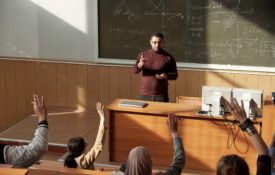-
Feeling Lonely? Your Brain May Process the World Differently
The U.S. is in the midst of a loneliness epidemic. For a lot of people, the feeling is even more pronounced during the holidays. In addition to the emotional impact of chronic loneliness, it has some
-
Brain Scans Reveal That Loneliness Changes the Way We View the World
Humans are meant to be around one another. It’s been that way for millennia. We needed each other to hunt, construct homes, procreate, care for our offspring and protect one another against the saber-toothed tigers
-

Brain-to-Brain Synchrony Between Students and Teachers Predicts Learning
Monitoring of students’ brain activity shows that “getting on the same wavelength” within groups of students and between students and their teacher is predictive of learning outcomes.
-
A Decoder That Uses Brain Scans to Know What You Mean — Mostly
Scientists have found a way to decode a stream of words in the brain using MRI scans and artificial intelligence. The system reconstructs the gist of what a person hears or imagines, rather than trying
-

Lonely People’s Divergent Thought Processes May Contribute to Feeling “Alone in a Crowded Room”
Lonely individuals’ neural responses differ from those of other people, suggesting that seeing the world differently may be a risk factor for loneliness regardless of friendships.
-
U.S. Kids Are Falling Behind Global Competition, but Brain Science Shows How to Catch Up
On vital measures that predict later success in school and life, small children in the U.S. do worse than kids in comparable countries. This distressing information comes from an Organisation for Economic Cooperation and Development (OECD) study of

